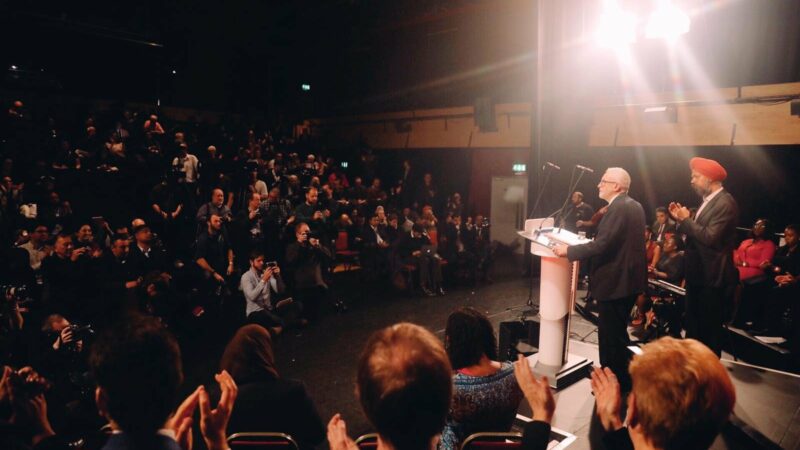
In a political system dominated by lies, the most damaging are the ones we tell ourselves. Within minutes of Thursday’s exit poll predicting Labour’s routing, two explanations were ready to go. The first is that Labour is too left-wing. The second is that the pledge for a second referendum lost it. There may be some truth in both, but neither can explain the result. We need an explanation that makes sense of the steady decline of the Labour vote over the past decade, and the similar pattern in other countries across Europe and the Americas.
They have appeal nonetheless. Why? Because they are comforting. Both explanations, in their own way, offer false hope. To the Labour right, the first suggests that if they regain control of the party the problems are solved. For the Labour left, the second reassures us that once Brexit is over the party can run a similar campaign with no referendum, and then win. Neither seems likely.
Is Labour too left-wing?
If you already believe that Labour is too left-wing, it’s easy to find evidence to back you up. After all, Jeremy Corbyn is the most left-wing Labour leader in recent history and the party has just suffered the worst electoral defeat since 1935.
The numbers tell a more complex story. There have been four general elections in my adult life: for the first, Labour was led by its right-wing; the second by the soft-left; and the third and fourth by its left. Electoral success can be measured in a number of ways: total seats, change in seats, vote-share and change in vote-share (swing). By nearly all measures, the 2017 election under Corbyn was the most successful, but by the most important indicator, seat-total, 2019 under Corbyn was the worst. But the other two were not shining examples either: in 2010, Labour lost almost double the number of seats as 2019; and 2015 gave the party its worst vote-share.
There is another way of looking at this record. It took five years for Tony Blair and Gordon Brown to lose 97 seats, five years for Ed Miliband to lose 26 seats, and four and a half years for Corbyn to lose 30. The pattern of steady decline is shared by all wings of the party.
Did the second referendum lose it?
Again, it is easy to marshal evidence to support this claim. In 2017, when Labour was led by Corbyn, had a radical manifesto, and promised to ‘respect the result’, it did well. In 2019, when it was led by Corbyn, had a radical manifesto, and pledged a new referendum, it did poorly. Is it that simple?
It doesn’t seem likely. Last week, I went out with a hat, coat and gloves and did not get wet. This week, I went out with a hat, coat and no gloves and was drenched. Is this because I wore no gloves? That may not have helped, but a bigger factor was the change in weather: last week the rain was light; this week it was torrential.
The political weather has changed over the last two years. In 2017, when Labour offered a soft-Brexit, this was popular on both sides of the divide. It was before the People’s Vote campaign took off, and before ‘no deal’ became a serious possibility. In 2019, the debate is more polarised: voters are much more likely to want to either stop Brexit or have a hard Brexit. Any position will struggle to square this circle.
The second referendum position undoubtedly lost the party many Leave voters. But what position would have done better? Even without the referendum in the manifesto, would a ‘Labour Brexit’, with the necessary delay to negotiate it, have been competitive against Boris Johnson’s ‘get Brexit done’ offer? Labour campaigned for Remain and is seen as pro-immigration. Would it have had the credibility to out-Brexit the Tories? And what would have been the political cost?
As bad as this result was, it could have been worse. Labour might have tried and failed to retain more Leave voters, and lost hundreds of thousands of Remain voters in the process.
So, what did go wrong?
The above explanations may, of course, form part of the story. It is plausible that either a different Brexit position or a more moderate manifesto would have won more seats. But neither can offer a full account and their appeal is not in their explanatory strength but their convenience. They are propaganda masquerading as analysis. They offer an easy route for future success, but it is a route paved with false hope.
That’s not what we need. We need an honest and rigorous analysis of the political landscape and the prospects for the future. I do not have that analysis, and I’m suspicious of anyone who thinks they already have it.
However, I do have some suggestions for how we might evaluate a potential contender. Any explanation of this election result must also make sense of the ones that came before, and the EU referendum too. It should place UK politics within the wider context including Donald Trump, the collapse of the French Socialist Party and the rise of the far-right across Europe. It should grapple with the evidence that suggests voters’ perception of Corbyn himself was a bigger factor than both Labour’s position on Brexit and its economic policies, and the evidence that Labour lost more of its Remain voters than its Leave voters. It needs to explain why Labour’s promises lacked credibility when it was the Tories who were constantly lied. Above all, it must be evaluated on the basis of how much it explains, not how reassured it makes us feel.




More from LabourList
‘Labour council candidates – it’s tough, but all is not lost’
‘Labour won’t stop the far right by changing leaders — only by proving what the left can deliver’
‘Cutting Welsh university funding would be economic vandalism, not reform’